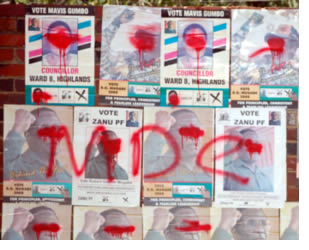 I got into line to vote fairly early this morning. Anyone who knows me will tell you it’s no mean feat to get me anywhere on time – never mind early! That shows you how seriously I’m taking voting this year. In line by 6.20 am.
I got into line to vote fairly early this morning. Anyone who knows me will tell you it’s no mean feat to get me anywhere on time – never mind early! That shows you how seriously I’m taking voting this year. In line by 6.20 am.
I know that Mugabe’s more unpopular than ever this election and yet still he holds so many of the trump cards: police and soldiers forced to vote in the presence of their commanding officers; free advertising on state media; presidential appointees running everything associated with the elections – constituency boundaries, location of polling stations, the voters’ roll itself.
So, I knew it was important to make sure I cast my own vote – no rigging leeway afforded the Zimbabwean regime by me staying away.
I think we must have been at a ‘model’ polling station – Courtney Selous School in Greendale, Harare – because there was media galore there. Media vans trailing cables and equipment parked along the road outside the school. A variety of journalists walking up and down the queues asking earnest questions and filming ‘democracy’ in progress. I can only hope that they moved on to a less ‘model’ polling station to film the real action!
I couldn’t fault the process at all. Timely, orderly, polite (if you don’t count the glaring somebodies who stood in a silent, evenly spaced row, watching the queue of voters intently).
We would’ve made good TV. Rainbow nation – laughing and chatting together as we slowly but surely moved forward in our orderly queues into the voting station. The subtext in reality is that most people were going through the motions of voting for change – with very little real expectation that we could overwhelm Mugabe’s rigging machine. That would take a huge turnout and a unified opposition to achieve.
After I left the polling station with my partner, we travelled around the area to see how other polling stations were doing. All we could see were short queues everywhere – where were all the voters? Living in the rural areas post-Murambatsvina? Or part of the displaced in the Diaspora? Or disenfranchised through obstructive officialdom working for Tobias Mudede, the Registrar-General?
At one point we stopped on the side of the road to take photos of the graffiti and posters on walls and lamp posts. A young man standing nearby thought we were covertly filming someone. Rather officiously he called out to us asking whether we had sought the people’s permission to film them. Since there was no-one in frame we asked him what he meant.
He was unexpectedly hostile and clearly thought we were foreign, asking us where we were from. After a bit of a chat across the 10 meters of tangled bush that separated us, he came down to the road to talk to us. To prove to him that I was indeed local I showed him the little finger on my left hand – newly pinked by voting ink. His attitude changed in a flash. He started to talk animatedly about change and was very proud about the graffiti’d Zanu PF posters on the walls nearby. I asked him if he had voted yet, and from his reply got a strong sense that he wasn’t registered to vote. Impotent in electoral terms – his site of struggle is restricted to the battle of posters on the city’s walls.



 I got into line to vote fairly early this morning. Anyone who knows me will tell you it’s no mean feat to get me anywhere on time – never mind early! That shows you how seriously I’m taking voting this year. In line by 6.20 am.
I got into line to vote fairly early this morning. Anyone who knows me will tell you it’s no mean feat to get me anywhere on time – never mind early! That shows you how seriously I’m taking voting this year. In line by 6.20 am.





